The AmCham Story
THE BIRTH OF THE BUSINESS ENVIRONMENT IN SLOVAKIA
HOW IT ALL STARTED?
 More than 100 years ago, the United States of America was the final destination of numerous Slovaks emigrating overseas. Later, when the World got divided into the "bad and decadent West" and the "friendly Soviet Union", everything originating in the U.S. symbolized regression or admiration of the wicked and corrupt capitalism. Half a century ago, hardly anyone would have predicted that American companies would like to come to Slovakia to pursue their business here.
More than 100 years ago, the United States of America was the final destination of numerous Slovaks emigrating overseas. Later, when the World got divided into the "bad and decadent West" and the "friendly Soviet Union", everything originating in the U.S. symbolized regression or admiration of the wicked and corrupt capitalism. Half a century ago, hardly anyone would have predicted that American companies would like to come to Slovakia to pursue their business here.
The official kick-off date when the American Chamber of Commerce was founded in Slovakia was October 27, 1993, but the official approval by the Ministry of Interior came in 1994. At that time, Slovakia was the World's youngest democracy, and only a handful of American companies did business there. There was a feeling of "curiosity" from investors abroad who were considering their entrée to the Slovak market. “AmCham was a vehicle for American-based companies to be involved in a newly emerging country that little was known about as Slovakia had been part of the Soviet bloc, not engaged in international business or our social norms,“ remembers Patrick Uram, the Chamber's Executive Director between 1996 and 1998. At the time of its foundation, the Chamber had 31 members.
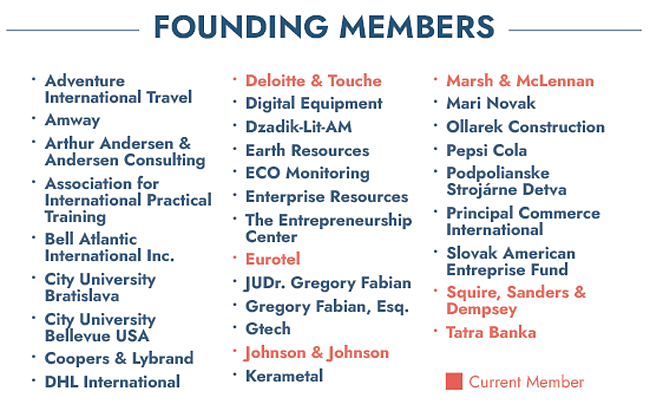
LIBERALIZING ECONOMY
With euphoria about this newly founded state came also the first significant economic decisions. The Slovak Republic, as one of the successor states of former Czechoslovakia, took over assets worth billions of crowns, including entire companies and plants, many of which did not manage to generate a profit and find customers even four years after changing over to a market economy. The government, headed by Prime Minister Vladimír Mečiar, wanted to solve this problem by selling some part of these state-owned assets. Especially, the second privatization wave was of major significance. Foreign investors, however, could not fully participate in it, since this was simply not possible under the applicable legislation of that time.
 Nevertheless, the country's GDP saw growth for the first time since 1989 (based especially on the export of semi-finished products). However, small and medium-sized enterprises were increasingly under pressure and disadvantaged in comparison to the privatized companies. Corporate taxes remained high and companies had to submit 40 percent of their gross profit to the state. Some of them could apply for a so-called “tax holiday” lasting 5 to 10 years. While foreign investors were interested in this exception, at the same time, they fine-tuned their investments to be ready to move away from Slovakia after the "holiday" expired. Fortunately, the “doomsday scenario” did not materialize and it was also thanks to AmCham Slovakia that many companies decided to stay. At that time, AmCham openly declared its policy of maintaining a constructive dialog with any government in power, while it also strived to convince companies to look at Slovakia from a longer-term perspective. As a result, AmCham became a respected voice during this period, especially by foreign companies with overseas participation. The chamber created the necessary channels for a systematic discussion with the government.
Nevertheless, the country's GDP saw growth for the first time since 1989 (based especially on the export of semi-finished products). However, small and medium-sized enterprises were increasingly under pressure and disadvantaged in comparison to the privatized companies. Corporate taxes remained high and companies had to submit 40 percent of their gross profit to the state. Some of them could apply for a so-called “tax holiday” lasting 5 to 10 years. While foreign investors were interested in this exception, at the same time, they fine-tuned their investments to be ready to move away from Slovakia after the "holiday" expired. Fortunately, the “doomsday scenario” did not materialize and it was also thanks to AmCham Slovakia that many companies decided to stay. At that time, AmCham openly declared its policy of maintaining a constructive dialog with any government in power, while it also strived to convince companies to look at Slovakia from a longer-term perspective. As a result, AmCham became a respected voice during this period, especially by foreign companies with overseas participation. The chamber created the necessary channels for a systematic discussion with the government.
“AmCham Slovakia and the Slovak Republic grew up together. As the Slovak Republic was hard at work on setting up its infrastructure to do business as a country at the heart of Europe, so too was the American Chamber of Commerce hard at work on setting up its infrastructure,” said Beverly Douglas, AmCham's Executive Director from 1993 to 1996.
In the '90s, the Chamber was very helpful in liberalizing the local economy. AmCham was instrumental in organizing several road trips for various Slovak governments to the U.S., to attract more investors to Slovakia. In 2011, AmCham compiled an analysis consisting of 10 steps necessary to be taken to increase the volume of direct foreign investments (10 Steps to Winning the FDI Race).
 Even today, investments constitute one of the priorities of the American Chamber of Commerce. The Chamber affects the buildup of a stable and predictable business environment, stimulating the growth of competitive companies and sectors of higher added value. One of the major success stories is the BSCF platform.
Even today, investments constitute one of the priorities of the American Chamber of Commerce. The Chamber affects the buildup of a stable and predictable business environment, stimulating the growth of competitive companies and sectors of higher added value. One of the major success stories is the BSCF platform.
YEARS OF INTEGRATION
 The year 1998 marked a real turning point for Slovakia and its business environment. The change of the government made it possible for the country to become a member of NATO in March 2004, and the European Union two months later. “The results of their reforms and the very business-like approach brought many changes to the Slovak business environment. The tax reform, the Labor Code reform, along many other reforms resulted in Slovakia becoming the destination of choice for many foreign investors at the end of the 1990s. AmCham played an important role in supporting those reforms, often at the request of the government, which, as we saw these reforms as positive for the business environment and therefore supportive of our members, we were eager to do so,” said Jake Slegers, who heads AmCham as Executive Director since 2000 to 2018.
The year 1998 marked a real turning point for Slovakia and its business environment. The change of the government made it possible for the country to become a member of NATO in March 2004, and the European Union two months later. “The results of their reforms and the very business-like approach brought many changes to the Slovak business environment. The tax reform, the Labor Code reform, along many other reforms resulted in Slovakia becoming the destination of choice for many foreign investors at the end of the 1990s. AmCham played an important role in supporting those reforms, often at the request of the government, which, as we saw these reforms as positive for the business environment and therefore supportive of our members, we were eager to do so,” said Jake Slegers, who heads AmCham as Executive Director since 2000 to 2018.
The government of Prime Minister Mikuláš Dzurinda launched several strategic reforms, prepared by the ministries, who were also joined by experts from the American Chamber of Commerce. This gave rise, e.g., to the Strategy for the Development of Slovakia's Competitiveness until 2010 or the Minerva initiative, which also aimed to support the creation of a knowledge-based economy. As part of the Milénium project, schools and other educational institutions were decentralized and placed under the control of local self-government. To help fresh university graduates enter the job market, AmCham’s Job Fair was launched, first organized in 1999. The influx of new foreign investments and the growing employment rate were also supported by the amended Labor Code, introducing more flexible employment forms. AmCham was also behind these changes. Perhaps one of the most significant changes, at least regarding its impact on the business environment, was the 19% flat tax, which became effective on January 1, 2004.
THE CRISIS OF THE "SMALL AND MEDIUM-SIZED" COMPANIES
The 2006 change to a new left-wing government was accompanied by the celebration of Slovakia's accession to the Schengen zone. Three years later, the country finally consummated its EU project through its adoption of the common currency. During those years, the American Chamber of Commerce focused on three major fields. The first one was the setting of the new tax policy and investment incentives. AmCham responded to the amendments of the acts on the income tax and VAT by activating its tax committee. Its members conducted extensive talks with the representatives of the Ministry of Finance, focusing mainly on the taxation of stock options.
The discussions on the new rules for purchasing goods and services were equally intensive. AmCham formed a special task force that negotiated with the Finance Ministry as well as the Public Procurement Office. Since then, the issue of public procurement has become a stable item on AmCham's agenda, continuously discussed with the government. The task force strives to influence legislation so that public procurement processes become more efficient and more transparent.
While in 2010, the government and the public dealt with the announced mass layoffs in larger companies in response to the global economic crisis, a special survey conducted by the American Chamber of Commerce revealed that there were other and more sensitive spots of Slovakia's economy and job policy - i.e. small and medium-sized enterprises. In 2010, AmCham directed the attention of its members, the Slovak government, and the media, towards the problems of small and medium-sized enterprises and conducted its first comprehensive SME survey. The findings of the same survey conducted in 2013 revealed that 67% of SMEs consider corruption to be a major obstacle to their business.
TIME FOR EDUCATION
In the years when the social democrat government was replaced by the right-wing cabinet of Prime Minister Iveta Radičová, the economic crisis hit the entire Eurozone. AmCham members quickly understood that during these difficult times, it was necessary to double the efforts in acquiring new investors, potential customers as well as suppliers, and employers. Thus, the main topic of the year 2011 was foreign direct investments. FDI has also been discussed in a regional context. AmCham’s office in Košice, opened in 2003, has been instrumental in attracting investment into the region of Eastern Slovakia. Since Radičová's government fell in October 2011, AmCham decided to discuss the future of FDI in Slovakia not only with the executive branch but also with the entire political spectrum. One of the key priorities that have emerged from these discussions and AmCham’s recommendations was education.
The quality of the education system profoundly affects the country's economic performance, as well as its business environment. While the new government replacing Radičová's cabinet tackled this issue only marginally, the American Chamber of Commerce dedicated the entire year 2012 to education.
 2012 was AmCham’s “Year of Education.” This issue was definitely neither new nor unknown to AmCham. At the time when Ján Mikolaj was still been Education Minister, a new AmCham committee was established in 2007, focusing on the Ministry's plans for restarting the entire education system. The task of the Business-Academic Committee was to ensure that the changes led to a better interconnection between universities and the needs of the companies, thus helping to cut the double-digit unemployment rate.
2012 was AmCham’s “Year of Education.” This issue was definitely neither new nor unknown to AmCham. At the time when Ján Mikolaj was still been Education Minister, a new AmCham committee was established in 2007, focusing on the Ministry's plans for restarting the entire education system. The task of the Business-Academic Committee was to ensure that the changes led to a better interconnection between universities and the needs of the companies, thus helping to cut the double-digit unemployment rate.
AmCham proclaimed the year 2012 as the "Year of Education", organizing several conferences, events, and education-expert meetings with governmental and entrepreneurial representatives, thereby launching the most intense discussion on the future of Slovakia's education system in the era of independence. AmCham continues with these efforts, frequently highlighting the fact that its members have pointed to a lack of qualified people with special skills as a major concern for business.
TIME OF NEGOTIATIONS
The government that took over in 2012 decided to open topics that were crucial for the functioning of companies. New rules were established in the social and labor field. AmCham activated its committees, as well as task forces. In the process of compiling proposals, the Chamber was a constructive discussion partner with the government. Its position grew even stronger after acquiring seats in the Council of Solidarity and Development of the Slovak Republic and in the Legislation Council of the Government. “We have reached a certain unprecedented level in interaction with the Slovak government. In the last few years, AmCham has become very much a partner of choice for several ministries,” says Jake Slegers, the Executive Director of the American Chamber of Commerce.
 A real challenge for the American Chamber of Commerce was also the amendment of the Labor Code in 2012. The Labor Code is and always has been a real "pain point" in the relationship between the government and business. Even at this time, AmCham managed to take a constructive stand: “We always listen closely to the issues and topics which are crucial for our member companies at any given time and do our best to reflect these in our activities and events,” Jake Slegers said. Similar to the preceding Labor Code amendments, also, in this case, AmCham advocated the same principles during the negotiations: The Labor Code should be modern, flexible, and supportive rather than an "employment brake".
A real challenge for the American Chamber of Commerce was also the amendment of the Labor Code in 2012. The Labor Code is and always has been a real "pain point" in the relationship between the government and business. Even at this time, AmCham managed to take a constructive stand: “We always listen closely to the issues and topics which are crucial for our member companies at any given time and do our best to reflect these in our activities and events,” Jake Slegers said. Similar to the preceding Labor Code amendments, also, in this case, AmCham advocated the same principles during the negotiations: The Labor Code should be modern, flexible, and supportive rather than an "employment brake".
AmCham has been commenting on labor legislation since 1998. It commented and proposed changes for the adoption of the 2011 Labor Code amendment proposed by the Minister of Labor, Social Affairs and Family, Jozef Mihál, as well as the 2012 amendment proposed by Minister Ján Richter. In its negotiation efforts, AmCham adheres to two basic principles: The Labor Code ought to be flexible and support the creation of new jobs.

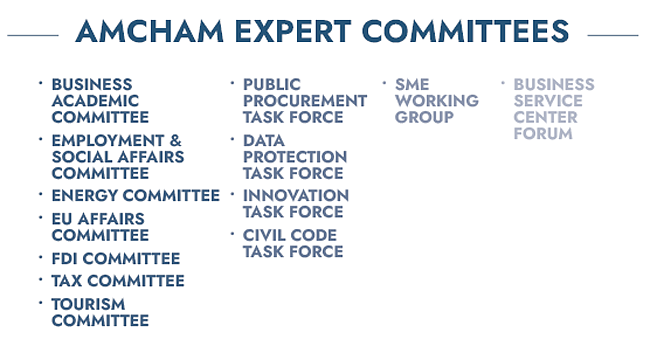
THE RULE OF LAW INITIATIVE
The findings of independently conducted research as well as feedback from the business community convey a clear message. Even today, entrepreneurs are worried about corruption, the condition of the judiciary, and the non-transparent adoption of laws. Surveys made among small and medium-sized enterprises in 2010 as well as in 2013 even indicated that the perception of these issues is getting worse. Survey outcomes revealed that 67% of SMEs view corruption as a significant problem affecting the business environment in Slovakia.
 Slovakia's image as a sought-after investment location has been damaged further by ineffective and sluggish court proceedings. Businesses, which are already present in Slovakia, are troubled by the frequently changing laws; moreover, they lack the chance to comment on them appropriately. The interdepartmental review procedures are often very brief and many laws get amended indirectly.
Slovakia's image as a sought-after investment location has been damaged further by ineffective and sluggish court proceedings. Businesses, which are already present in Slovakia, are troubled by the frequently changing laws; moreover, they lack the chance to comment on them appropriately. The interdepartmental review procedures are often very brief and many laws get amended indirectly.
To help solve this situation, AmCham initiated the creation of a large coalition of employer unions, chambers of commerce, and other business associations that support the “Rule of Law” initiative. Apart from AmCham, the Rule of Law initiative was supported by 13 additional organizations, jointly accounting for 98% of all Slovak employers and their employees. The major objective was to turn Slovakia into a country where taking a bribe is no longer a matter of course or an act of heroism; where the judiciary is no longer a hurdle, but rather the guardian of the cleanliness of the business environment; and where laws are adopted through a process of constructive and professional dialogue.
AMCHAM WENT FURTHER IN 2015 – 2017
 In 2015, the overriding focus of all three priority areas – Policy and Advocacy, Economic Impact and Development, and Membership Engagement – was the “Year of Trade” which was addressed through various events and initiatives, including:
In 2015, the overriding focus of all three priority areas – Policy and Advocacy, Economic Impact and Development, and Membership Engagement – was the “Year of Trade” which was addressed through various events and initiatives, including:
- the Business Services Forum conference,
- the annual EU Conference,
- the AmCham-Forbes Conference,
- the Case of Investing in Europe/TTIP event,
- the Košice Invest conference,
- and the FDI survey carried out throughout the year, culminating in a conference in January 2016.
These initiatives and events all facilitated dialogue, partnership building, and the exchange of market insights, contributing to the expansion of trade volumes and investment opportunities.
 An overriding focus of 2016 was AmCham Slovakia’s “e-Year”, with four main themes: digital agenda, energy, employment and education, which were addressed through various seminars, workshops, and conferences on emerging technologies, digital transformation, and e-commerce trends, and other events, including:
An overriding focus of 2016 was AmCham Slovakia’s “e-Year”, with four main themes: digital agenda, energy, employment and education, which were addressed through various seminars, workshops, and conferences on emerging technologies, digital transformation, and e-commerce trends, and other events, including:
- The Slovak presidency of the Council of the European Union, with AmCham’s activities featuring an annual conference with the European Commission, a visit to Slovakia of an AmCham EU delegation, and a business breakfast with the Ministry of Foreign and European Affairs.
- The Slovak parliamentary elections, featuring an open call to the relevant political parties and a pre-election debate on rule of law issues.
- The US presidential elections when AmCham organized an election night event along with the U.S. embassy
By facilitating knowledge sharing and collaboration among businesses, academia, and government stakeholders, AmCham played a pivotal role in advancing Slovakia's digital economy agenda and fostering a conducive environment for innovation and entrepreneurship.
 The overriding focus of 2017 was the “Year of Human Capital” which, besides active legislative involvement in education and labor/employment-related policies, and including talent development and the lack of a qualified workforce, was also addressed through various events and activities in both Bratislava and Košice including:
The overriding focus of 2017 was the “Year of Human Capital” which, besides active legislative involvement in education and labor/employment-related policies, and including talent development and the lack of a qualified workforce, was also addressed through various events and activities in both Bratislava and Košice including:
- A high-level conference on skills required in the era of industry 4.0;
- The Train the Trainer program which equipped high school and university teachers with advanced teaching methods and competencies;
- Accredited university courses which were successfully completed by 148 students;
- AmCham´s unique Mentor Network Program provided direct mentoring opportunities for 82 talented students from all around Slovakia by the same number of CEO level executives of AmCham member companies;
- Continuing the tradition of delivering resume workshops with career guidance which provided assistance to university students.
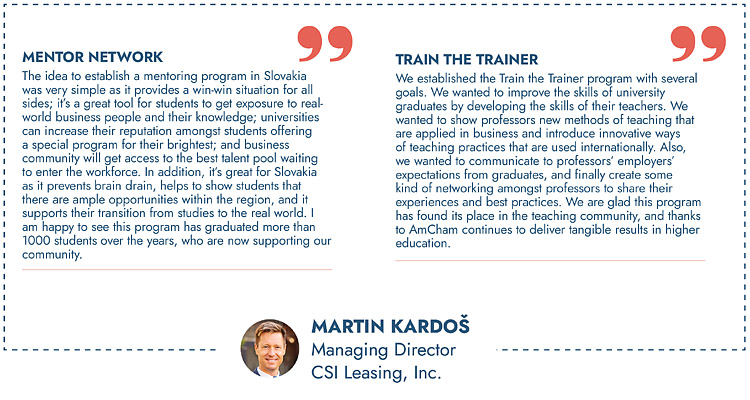
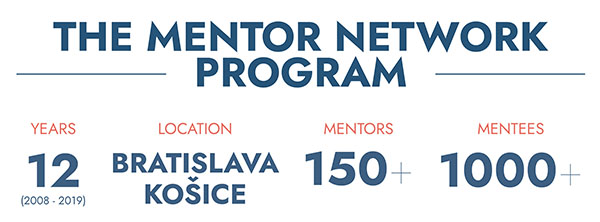
Additionally, through partnerships with educational institutions, government agencies, and corporate entities, AmCham promoted lifelong learning, talent retention, and the advancement of a skilled and inclusive workforce, thereby supporting sustainable economic development and social progress in Slovakia.
Throughout these initiatives, the American Chamber of Commerce in Slovakia has remained committed to its mission of fostering a vibrant business environment, promoting transatlantic partnerships, and driving prosperity and innovation in the Slovak economy. By leveraging its extensive network, expertise, and resources, AmCham continues to play a pivotal role in shaping Slovakia's economic future and strengthening its international ties.
THE MISSION OF THE AMCHAM CONTINUES!
AmCham Slovakia has more than 300+ members, 21% of whom are U.S. companies, 39% Slovak and 40% multinational corporations. These companies represent approximately 100,000 jobs and 20% of Slovakia’s GDP. To ensure more jobs and increasing living standards, Slovakia needs prospering companies and these in turn need a healthy business environment. The mission of the American Chamber of Commerce in Slovakia is the improvement of this business environment. The 30 years of AmCham’s presence in Slovakia have brought numerous positive results so far, which proves that AmCham is pursuing its mission well!

CONGRATULATIONS AMCHAM SLOVAKIA!
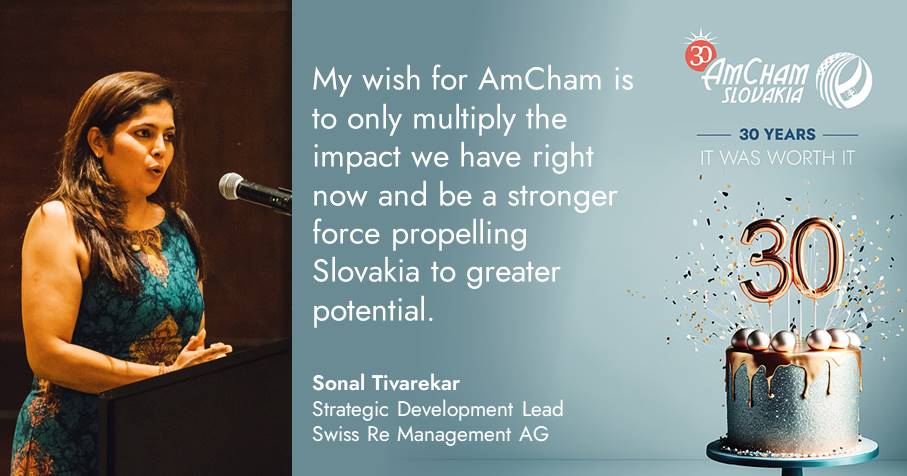
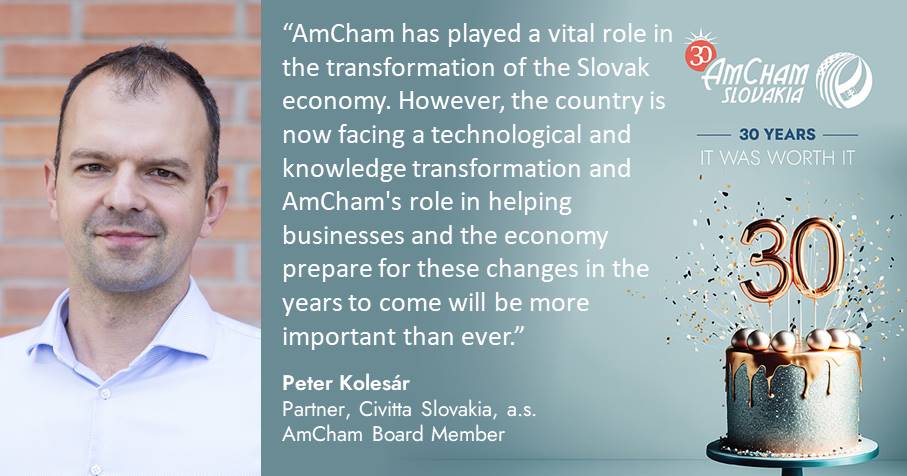
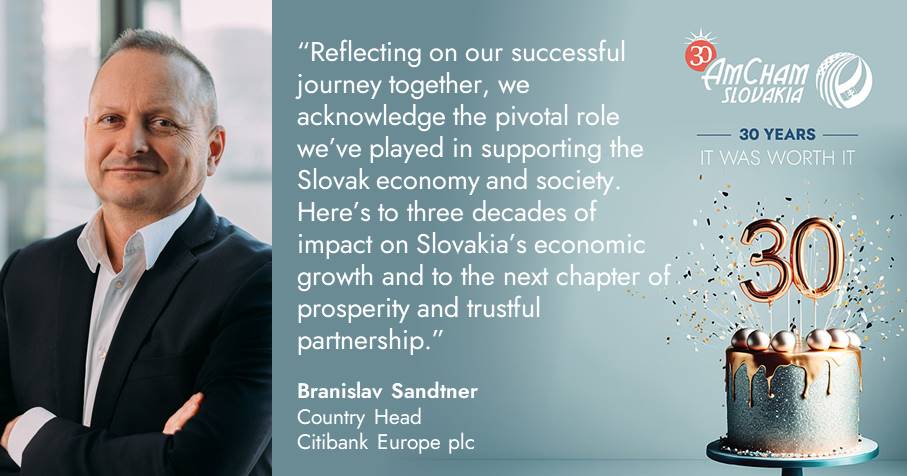
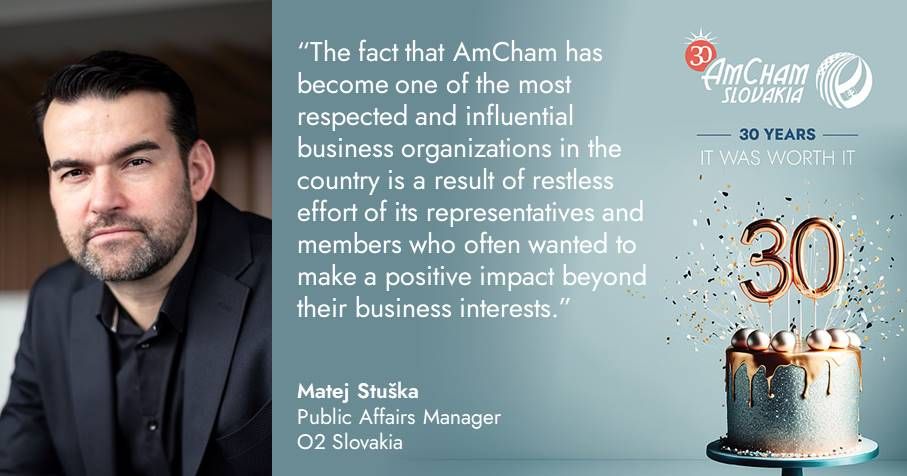
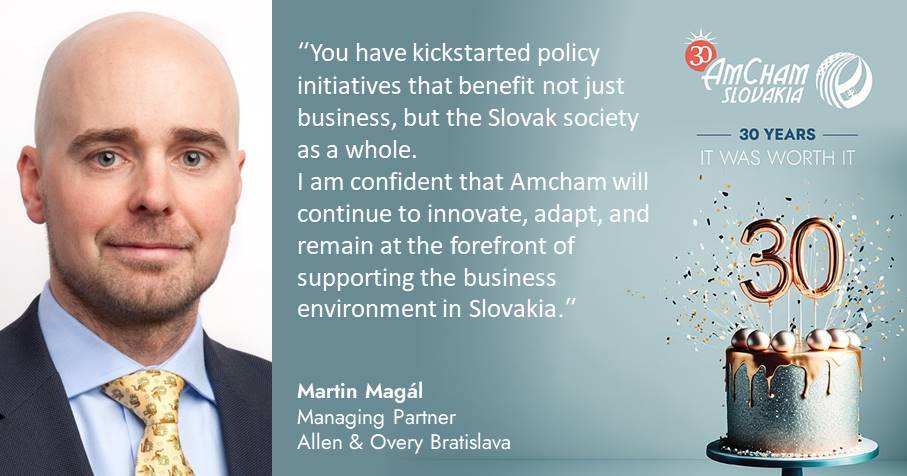
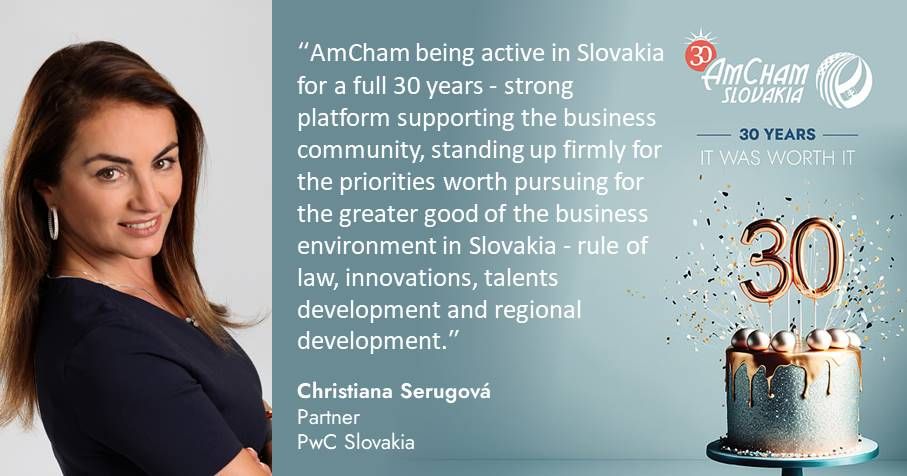
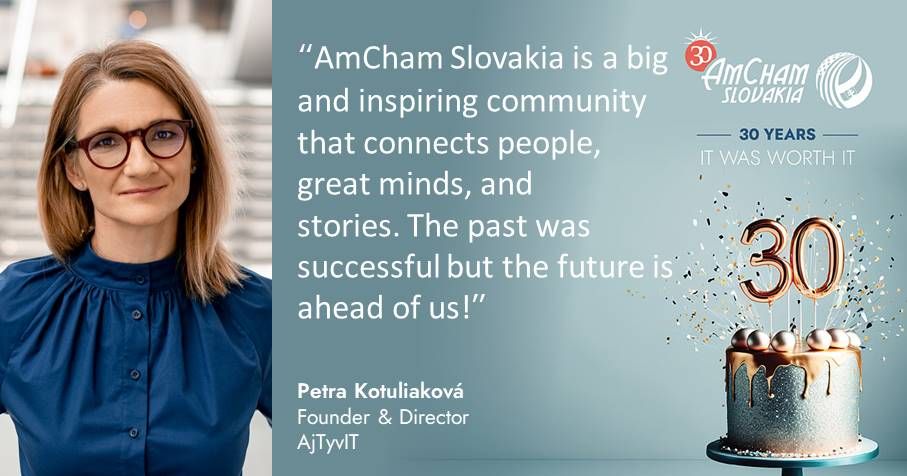
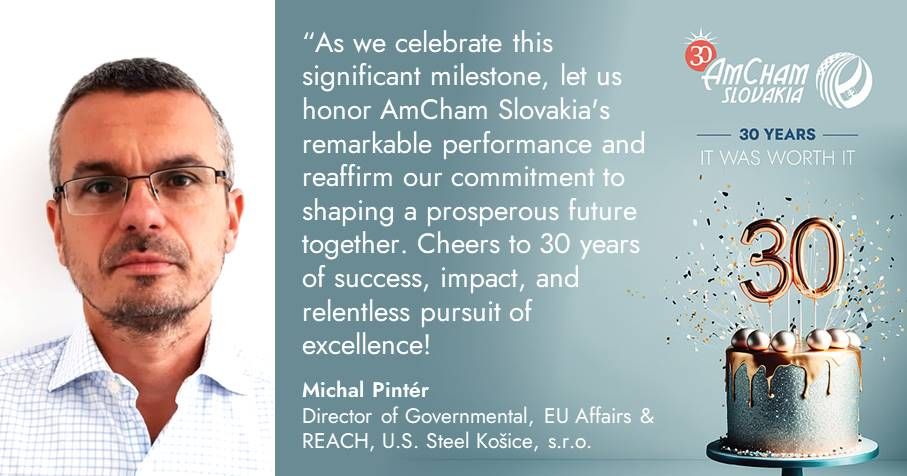
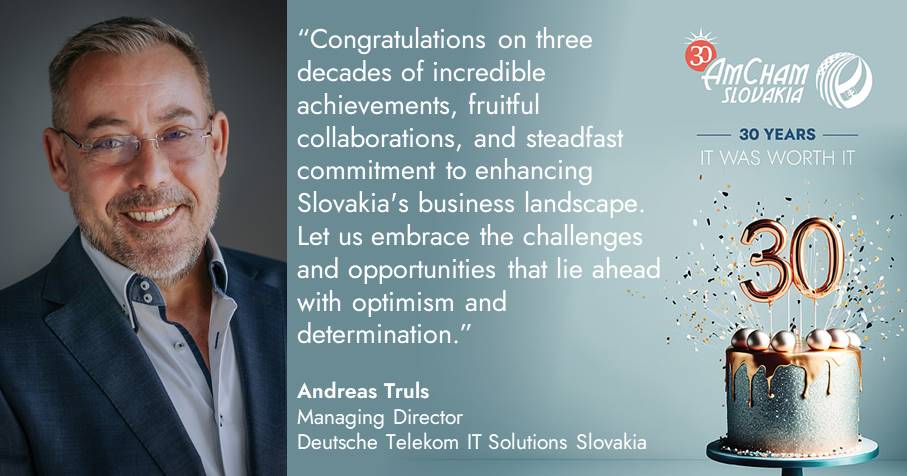
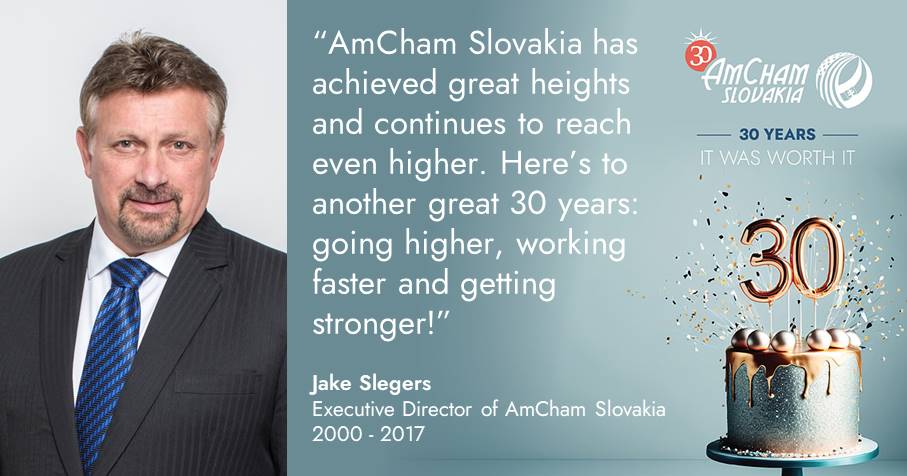
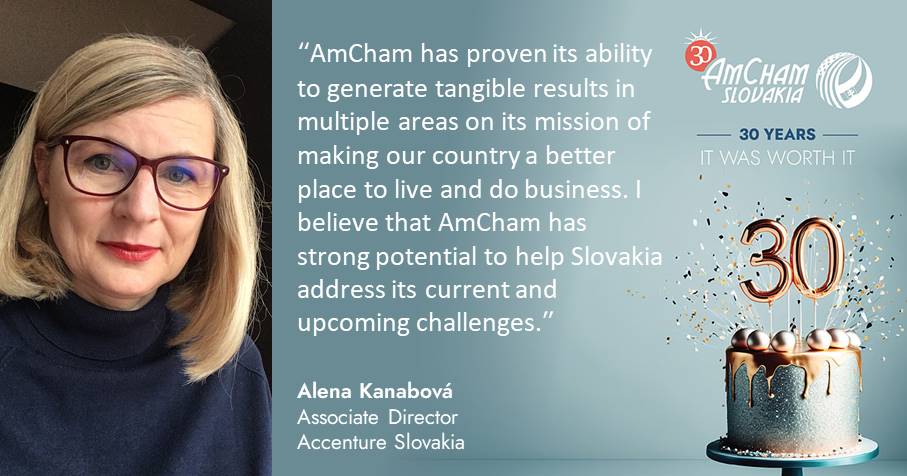
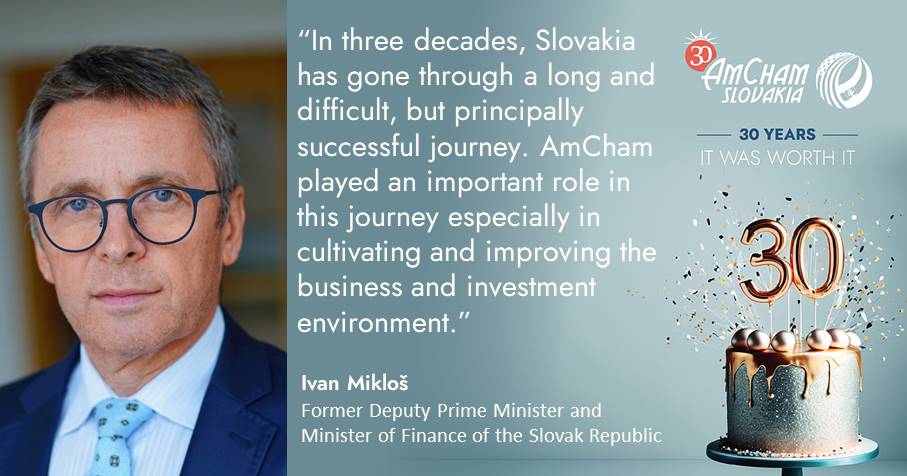
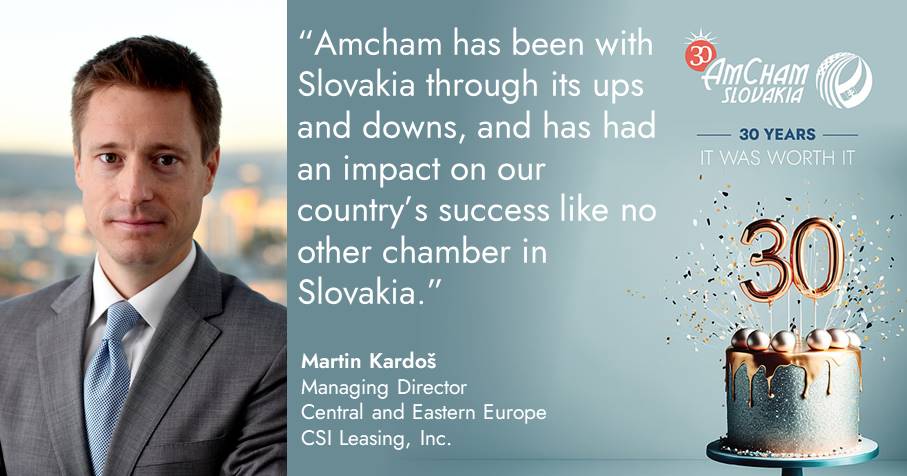
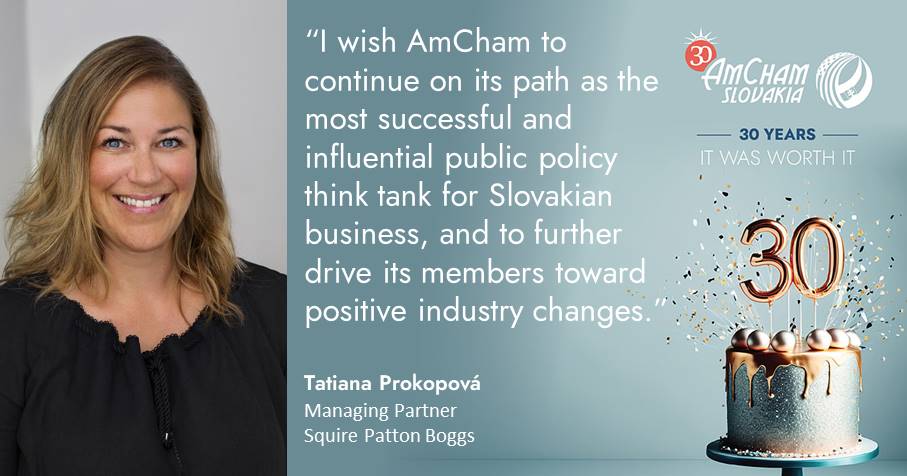
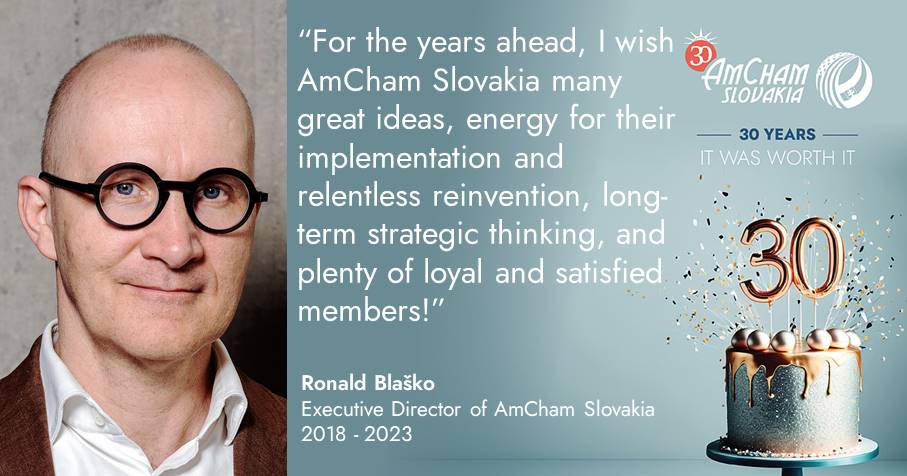
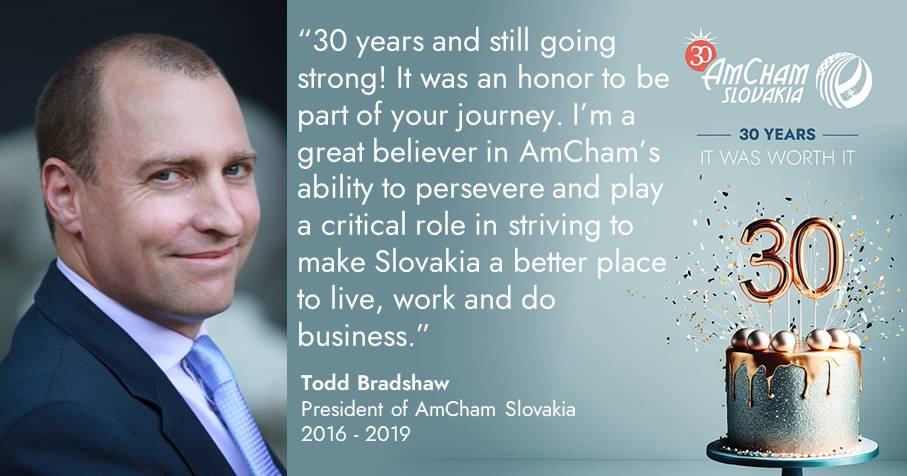
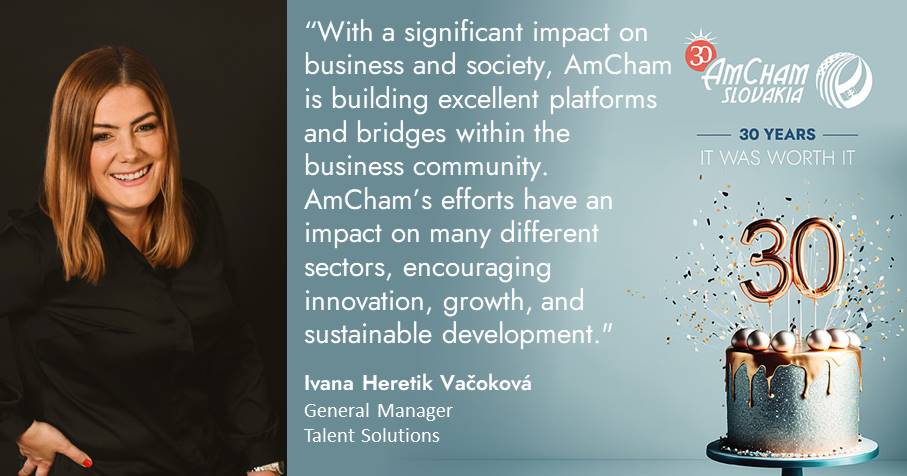

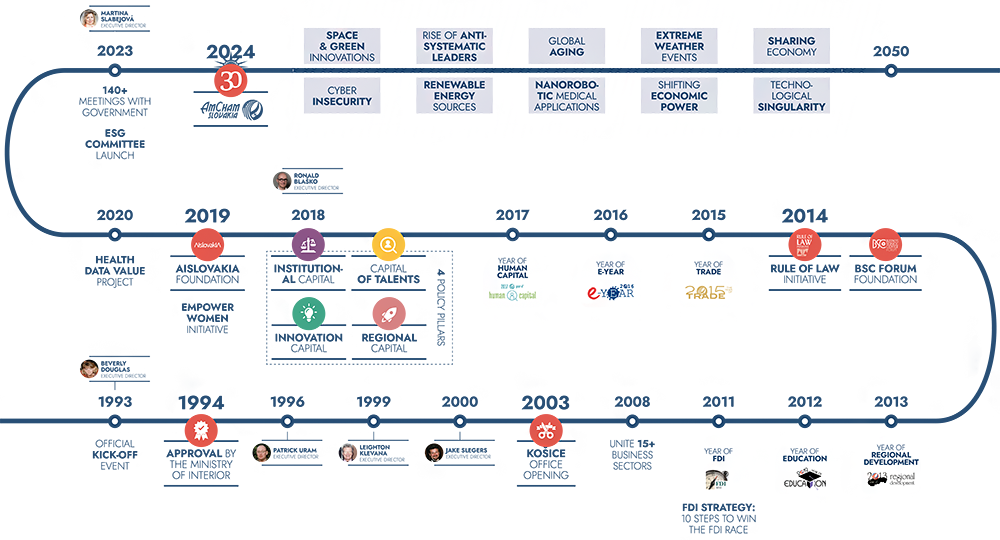
Follow us